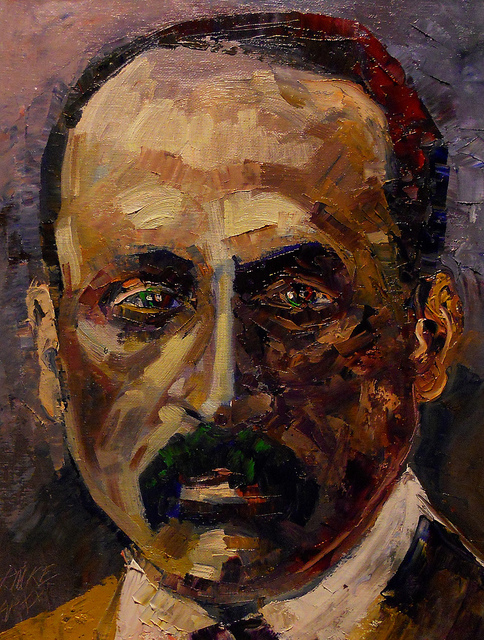
“The work of the eyes is done. Go now and do the heart-work on the images imprisoned within you.” ~ Rainer Maria Rilke
.
I’ve been writing consistently for about two years now.
Hardly a week passes that I don’t have an existential crisis. Am I good enough? Does my writing align with my higher intentions?
I’m elated when I get published and deflated when I don’t. I feel connected to my purpose when I learn that my words helped a reader. I’m confounded when I’m ignored—and worse, when a reader (who has only read the headline) offers the most damning of praise, “Nice work.”
Creative expression—be it in writing, painting, song, dance or entrepreneurship—is often a solitary endeavour. Fraught with fears, it mirrors our thoughts, emotional states and self-discovery journey.
I was on a mental seesaw ride, constantly asking myself why I was writing. Then I came across Rainer Maria Rilke’s Letters to a Young Poet. These letters (particularly his first letter, written in Paris on February 17th, 1903) clarified everything.
I quickly recognised myself in his words—the reasons I love to create.
In the late autumn of 1902, a young aspiring poet by the name of Franz Xaver Kappus wrote to Rilke for an opinion on his poetry. He had learned that Rilke, like him, had attended the Military Academy in St. Polten, not far from Vienna, Austria.
Rilke was already a famous poet and had received many such requests, but a certain sense of kinship and resonance compelled him to write back. He continued corresponding with Kappus over a period of six years.
The letters turned out to be more like epistles, offering some of the most profound and penetrating words ever written—not only about poetry, but about the whole creative process. It was as if Rilke were writing to himself, clarifying his passion.
I go back to these four core messages in his first letter every time I question my dedication to writing.
1. Creativity is an internal process.
“Nobody can counsel and help you, nobody. There is only one single way. Go into yourself. Search for the reason that bids you write; find out whether it is spreading out its roots in the deepest places of your heart, acknowledge to yourself whether you would have to die if it were denied you to write. This above all—ask yourself in the stillest hour of your night: Must I write?”
I don’t write for my loved ones. I don’t write to promote my business. I write for myself. We all need to have that one thing at the core of our essence—a vehicle for going deep into ourselves, exploring the mysterious places of our heart and allowing our highest self to express itself.
We can use creativity to unearth our greatest fears and biggest obstacles. Through it, we can also discover the powerful forces within us that we can use as a springboard to fly.
Writing has become like breathing to me; I must write to keep living. It has become my way of making sense of myself.
Since I’ve made a daily practice of writing, going through life’s vicissitudes has not become easier, but I’m better prepared for them. Writing is now the foundation on which I lay all other building blocks to produce a better life for myself.
2. Creativity is cathartic.
“…depict your sorrows and desires, passing thoughts and the belief in some sort of beauty—describe all these with loving, quiet, humble sincerity, and use, to express yourself, the things in your environment, the images from your dreams and the objects of your memory.”
When we create, we venture into our past and confront painful moments stored away in our subconscious. Through our creative practice, we confront that hurt, rather than judging or numbing our feelings away for fear of facing them.
When I was 10 years old, I had to leave my comfortable surroundings and the warmth of the Ghanaian sun for the cold winters of England and a new school where foreigners were rare. It was through writing about my past that I finally understood that I had created a “tough guy” persona, and I didn’t allow myself to show any weaknesses. I carried this protective armour with me through most of my life—until my sudden epiphany that vulnerability had power.
3. Creativity pushes us to live a richer life.
“If your daily life seems poor, do not blame it; blame yourself, tell yourself that you are not poet enough to call forth its riches; for to the creator there is no poverty and no poor indifferent place.”
The content of our art directly reflects what we do with our lives. If we live in a mundane way, then our experiences, emotions and thoughts will be equally ordinary.
Writing helps me get out of my comfort zone and pushes me to lead a more meaningful, exciting existence. It has made me want to travel much more too. There is something about getting away from our everyday lives that invites rich experiences and connection to strangers. Whenever I strike up a conversation with a stranger, I seem to find a unique story and lesson.
4. We can’t be attached to the results of our creativity.
“Perhaps it will turn out that you are called to be an artist. Then take that destiny upon yourself and bear it, its burden and its greatness, without ever asking what recompense might come from outside.”
The Bhagavad Gita shares a similar message. We should not attach ourselves to the fruits of our efforts. We must create for the pure joy of the process. When our motivation is intrinsic, rooted in self-satisfaction, we enter a state of flow in which time and space collapse.
It’s difficult not to check the statistics on our blog post views or books sales. It’s hard to not be discouraged when an 18-year-old writes a Pulitzer Prize-winning piece of writing. It’s nearly impossible not to compare our creative successes to other people’s.
However, when we are clear about our motivations, then our expectations are thus defined.
I don’t write to make money, and I have no desire to become famous. I write for that pure feeling of joy and fulfillment. Of course, that doesn’t mean I don’t want to write a New York Times bestseller one day. Rather, it means that self-satisfaction and showing up in my best self is my raison d’être.
I know that the minute I allow the toxicity of external gratification to influence me, my creativity will be tainted—and I will lose the magic that made me start writing in the first place.
~
Rilke’s words soothe me. They confirm what I’ve always known deep inside my heart. Through creativity, we connect to our highest selves; that is how we can best express the purity of our message.
If we remain faithful to that message and work to strengthen our inner voice, then we become more consistently connected to our higher selves. And ultimately, this connection leads us to greater mastery of our craft and deeper service to humanity.
~
Author: Mo Issa
Image: Flickr/Arturo Espinosa
Editor: Yoli Ramazzina








Read 34 comments and reply